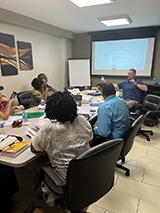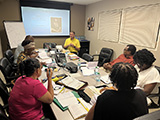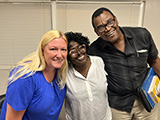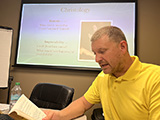 |
 |
 |
 |
 |
 |
 |
 |
 |
It is such a joy to be back in the CMA classroom again with the students from St. Martin. Last year’s class was Course #2 called Teaching Methods, and I only got 1 week with them. But now, after a few more courses, they’re ready for our first Doctrines Course that covers Theological Epistemology, Bibliology, Trinitarianism, the Doctrine of God, Christology, and Pneumatology. As you can imagine, it’s almost a pure fantasy to think that anyone can cover these subjects in a short 2 weeks span, but that’s all part of the fun.
My strategy for the course was to provide a robust overview and prime definition for each of the subjects by spending 2 days on each of them. After encountering the scaffolding for each subject, we’d spend the 2nd day delving further in detail to those particular that would best (1) be applicable to their ministries and (2) serves as defining features within each discipline. Each evening also had a short chapter of homework through a popular level book that summarized each of the subjects called “I Believe” by Thom Rainer.
One of the things I love about the students is their honesty and transparency in their discovery of the material. Seeing those figurative “light bulb” moments is so rewarding as a teacher, and it was nightly that their inquisitive questions pushed back the time limit on our evenings such that there was always meat left on the table.
We were also able to change our hosting location from last year’s class to the boardroom of a resort that one of our students worked at. The only challenge was that this windowless room left us literally in the dark with the frequent power outages that the island was plagued with.
A few of the students would bring snack and treats to share each night. We would be begin by praying together, and we repeated worked to answer the question, “What do I believe about what I believe?”, in an attempt to give operational definition to those Christian belief that we “know” but haven’t really worked to articulate. By the end of our class, it is my hope that each of them would be able to better defend the Christian faith with the ability to nuance with care and love those doctrines that define what it means to be a Christian.
